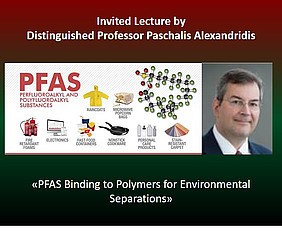The Distinguished Professor Paschalis Alexandridis at the Department of Chemical and Biological Engineering, University at Buffalo, The State University of New York (SUNY), will deliver an invited lecture on «PFAS Binding to Polymers for Environmental Separations» on Thursday 19/5, at 14:00, Hall K2.I2
Professor Alexandridis is one of the two scholars from the United States selected by the Greek Diaspora Fellowship Program (GDFP)
Abstract
Surface active per- and polyfluoroalkyl substances (PFAS) find niche applications because of their high chemical and thermal stability, their incompatibility with both water and hydrocarbons, and their unique ability to render surfaces non-stick. [DOI: 10.1016/j.cocis.2022.101571] However, several widely used PFAS surfactants have been found extremely resistant to degradation, accumulate in the environment, and have long half-lives in humans, consequently causing great concern. [DOI: 10.3390/surfaces3040037] [DOI: 10.1016/j.jhazmat.2021.128137] In the context of separating PFAS surfactants from aqueous media, we research how such surfactants bind to polymers that are free in solution or cross-linked in networks. We report here on ammonium perfluorooctanoate (PFOA) association (mixed micelle) structure and interactions with poly(ethylene oxide) homopolymers and block copolymers in water, [DOI: 10.1016/j.jcis.2021.10.176] and on PFOA binding to cyclodextrin-containing polymer networks. [DOI: 10.1021/acsmaterialslett.2c00168] We also discuss how surfactant-polymer binding can be disrupted for the regeneration of PFAS-adsorbent materials. [DOI: 10.1039/d1cp00049g] A detailed description emerges on how polymer segments distribute within PFAS micelles, which is used to evaluate the potential of functional polymers for the sequestration of PFAS pollutants.
Short CV
Paschalis Alexandridis is Distinguished Professor in the Department of Chemical and Biological Engineering at the University at Buffalo, The State University of New York (SUNY), where he has served as Director of Graduate Studies in Chemical Engineering, co-Director of the Materials Science and Engineering program, and Associate Dean for Research and Graduate Education in the School of Engineering and Applied Sciences. He holds a Diploma from the National Technical University of Athens (EMΠ) and a PhD from Massachusetts Institute of Technology (MIT), both in chemical engineering, and has carried out postdoctoral research in physical chemistry at Lund University. Alexandridis' research utilizes molecular interactions and supramolecular assemblies to develop processes that are environment friendly and energy efficient, and products with desired properties and function. Ongoing projects address structuring via self-assembly and directed assembly of block copolymers, environmentally responsible solvents, PFAS sequestration from aqueous solutions, and plastic recycling. He has authored 190 articles and 6 US patents (Google Scholar h-index 74 and 21000 citations). Alexandridis is a Fellow of the American Association for the Advancement of Science (AAAS), American Institute of Chemical Engineers (AIChE), and Royal Society of Chemistry (RSC). He is currently serving as Editor-in-Chief of the Journal of Dispersion Science and Technology.


